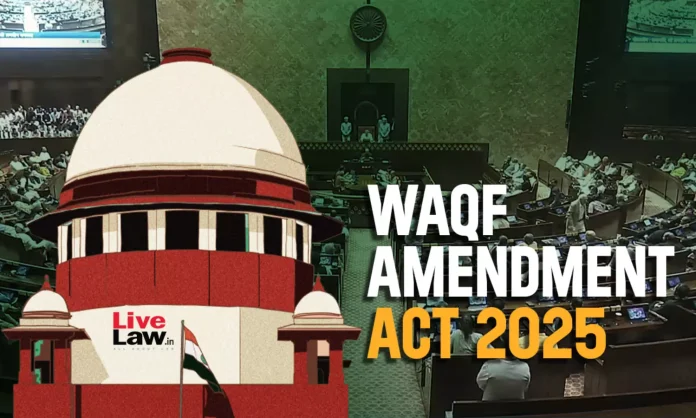The All India Muslim Personal Law Board (AIMPLB) and Mohamed Maqsoon Imran, the chief imam of Bengaluru’s Jamia Masjid, have jointly approached the Supreme Court to contest the Waqf (Amendment) Act, 2025. They argue that the Act violates Articles 14, 25, and 26 of the Constitution by altering the very essence of waqf, which traditionally refers to the permanent dedication of movable or immovable assets for religious, pious, or charitable purposes under Muslim law.
The petition claims that the amended provisions undermine the sacred and communal nature of waqf properties, while also compromising the democratic functioning and autonomy of Waqf Boards.
Filed as a public interest litigation through Advocate-on-Record Abid Ali Beeran P., the plea urges the apex court to nullify the contested provisions of the 2025 Amendment and restore the original Waqf Act of 1995. The petition emphasizes that waqf properties serve as essential community hubs and support structures for the educational and social upliftment of common Muslims. These properties, according to the petitioners, must remain under exclusive community control without external interference, in alignment with religious directives and established judicial decisions.
Several controversial amendments have been targeted in the plea. These include the removal of the “waqf by user” concept, the imposition of a five-year minimum practice of Islam to create a waqf, and the dilution of “waqf-alal-aulad” (family waqf). Other challenges include the extension of the limitation period to two years for waqf notifications, and the inclusion of two non-Muslim members in key waqf bodies like the Central Waqf Council and State Waqf Boards—moves alleged to infringe on constitutionally protected rights.
Another significant grievance lies with the newly added Section 3C, which stipulates that a property cannot be recognized as waqf unless a government-designated officer conducts an inquiry and decides whether it belongs to the government. This, according to the petition, will lead to the widespread loss of waqf lands, and until the inquiry is complete, the property will not be treated as waqf. The petitioners argue that such a mechanism, lacking impartiality and fairness, violates the principles of natural justice.
In a separate petition filed by AIMPLB and Mohammed Fazlurrahim, represented by AOR Talha Abdul Rahman, the Act is termed as a grave threat to the Muslim minority’s religious identity. The petition asserts that unlike other communities, Muslims now face numerous restrictions and preconditions for creating waqfs. It further claims that the control over waqf administration has been transferred from Muslims to statutory authorities, undermining religious freedom.
Another key issue raised is the removal of protection against adverse possession under limitation laws and the transfer of adjudicatory powers to government-appointed officers. The petition contends that these changes violate the fundamental rights of religious minorities and rely on majoritarian authority to dismantle constitutional safeguards.
A particularly contested provision is the requirement that only “practicing” Muslims can create waqfs. The petition argues that this introduces a subjective standard that could lead to administrative and judicial scrutiny of an individual’s personal faith—an approach it calls vague and constitutionally unsound.
The petitions are scheduled to be heard by the Supreme Court on April 16.




